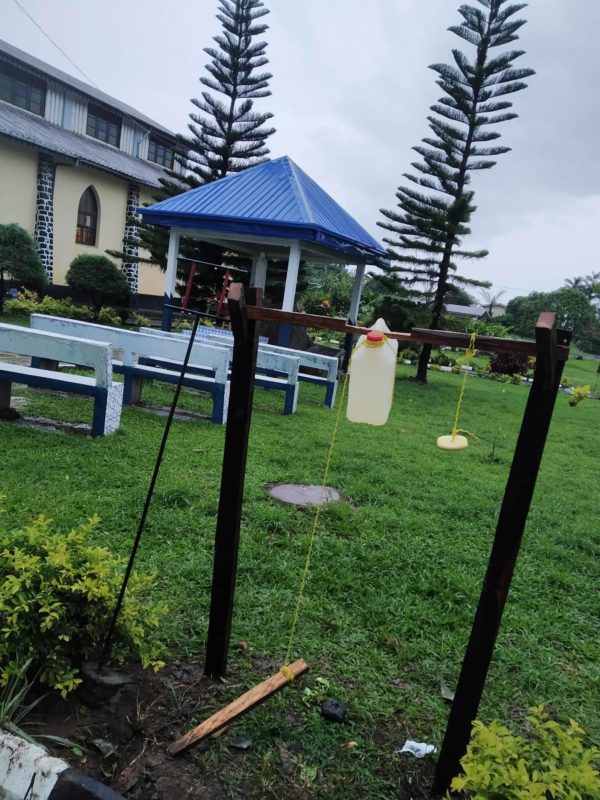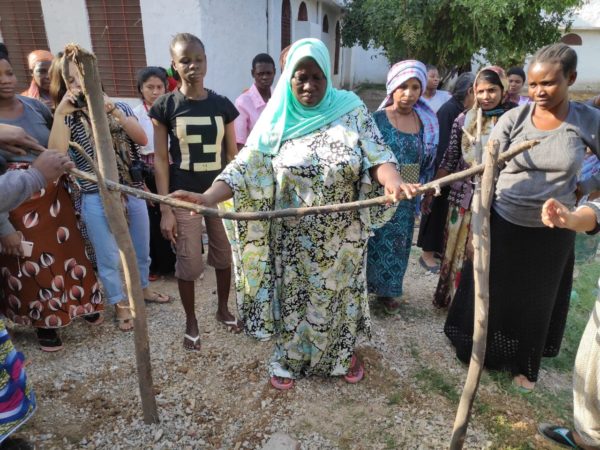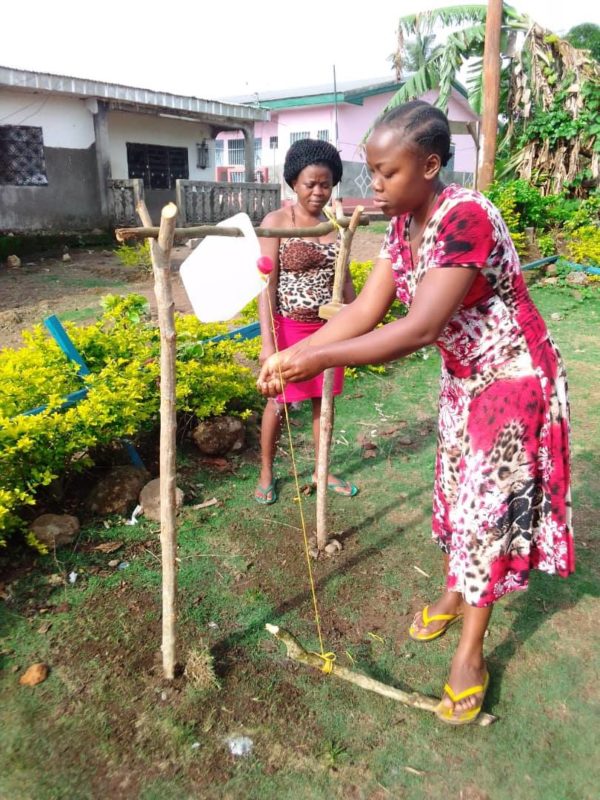Handwashing Made Easy
One of the most efficient sanitary solutions to share with communities is handwashing. It’s been rated as the number one method of mitigating the spread of disease by the WHO. Many people would assume that this is an obvious and straightforward necessity that the majority of people have access to.
However, many rural localities around the world are already experiencing water shortages, resulting in a restriction to this privilege. Few have access to a piped water supply or can’t utilize bodies of standing water to avoid mosquito propagation. This means that many communities can face difficulties in reducing the spread of COVID-19.
 A tippy tap station set up in Cameroon
A tippy tap station set up in Cameroon
Why Tippy Taps?
Tippy Taps resolve these challenges. Easily constructed with locally-sourced and salvaged materials at a low cost, they are a hands-free, low water-consuming solution that enables more people to stay hygienic even if there is no soap available. They can be installed near schools, at the homes of families and in public community spaces, which in turn inspires more hygienic habits – “health and wellbeing begin with handwashing.” Statistically, the spread of disease is reduced by over 40% and uses around 40 ml per use compared to alternative methods that use around 500 ml. The waste can also be reused to water plants or be put back into the water table.
The construction of Tippy Taps is one of a bundle of practical workshops that our Barefoot Enriche curriculum consists of. Combined with other insightful, easily replicable projects, each Solar Mama returns home with knowledge beyond Solar Engineering and enterprise and livelihood skills.
It is our continued objective to impart resiliency resources to women who will return to their respective communities, assume leadership roles and responsibilities and locally disseminate the information themselves. We expect this shared knowledge to help protect, uplift and inspire many more villages in many countries around the world.
Upon graduating and returning to their respective communities, our Cameroon Solar Alumni including Enow Mary and Sakwe Alice-Rein Nadoa decided to take their knowledge about Tippy Taps into surrounding communities. In collaboration with our ground partner RUWDEC, they have been hosting workshops about their construction and benefits. They intend to promote handwashing and healthy practices that keep people safe during a potential outbreak. For instance, a vast area in Buea, Cameroon known as Sappo received a number of Tippy Tap workshops.
 International Solar Mamas learn to build tippy taps at our Barefoot campus in India
International Solar Mamas learn to build tippy taps at our Barefoot campus in India
Mary explained that everyone is excited about learning new things, especially at this time. At first, some attendees were a bit reluctant, but the simplicity and enjoyment that came from the activity of building motivated participants by the end. Most people are receptive to useful information about how to maintain healthy communities and families. As a group, one Tippy Tap can be completed easily in under 40 minutes. Mary plans to spread the knowledge to more communities quickly, aware of the potential for them to save lives during the current situation.
“The Tippy Tap is a lifesaver to many. The idea in itself made people wonder, but after seeing the output they are amazed. It’s new to communities here, so everyone is like wow, this is cool.”
Soap and water amenities are known to boost a sense of comfort and pride, especially when some communities must walk an average of half an hour or more to reach their water source. Tippy Taps are easy to clean and maintain, and their affordability means that large numbers can be installed per village if needed. Modifications based on materials or location are also simple to change.
It’s as Easy as Found Objects and Some TLC
A 5L vessel, poles or sticks, string and soap are the needed materials. The jug can be anything from a detergent bottle to an oil container. Poles or sticks are ideally wood, but metal or plastic will also work. The variability means that any village around the world can use the resources they have available to them. A string is used to hang the soap and attach to a pedal on the ground that’s stepped on to pour the water out from the stem of the jug.
This makes the entire process hands-free aside from the touching of the soap. The poles create the standing A-frame structure that hangs the jug, also attached by string, to the structure. A hole is poked into either the jug’s stem, or can flow freely from the mouth when uncapped. Less water will flow, however, from a smaller poked hole.
There are several ways to construct Tippy Taps, and they can even be hung from a preexisting structure if more convenient. The design is known to attract children, who can even contribute to its building, keeping them engaged and instilling better hygienic behaviour in the process.
 Alice’s participant tries using the tippy tap
Alice’s participant tries using the tippy tap
As one of the simplest and most affordable ways to flatten the curve against the spread of COVID-19, we’re hoping to see these great hygienic allies gain traction in all regions that suffer from water shortages or lack of sanitary supplies. It’s an added bonus that our beneficiaries are women, who can take on greater responsibility in their communities through the sharing of the useful information they acquire during their time with Barefoot College.
Help us continue to support these potentially life-saving workshops here.



